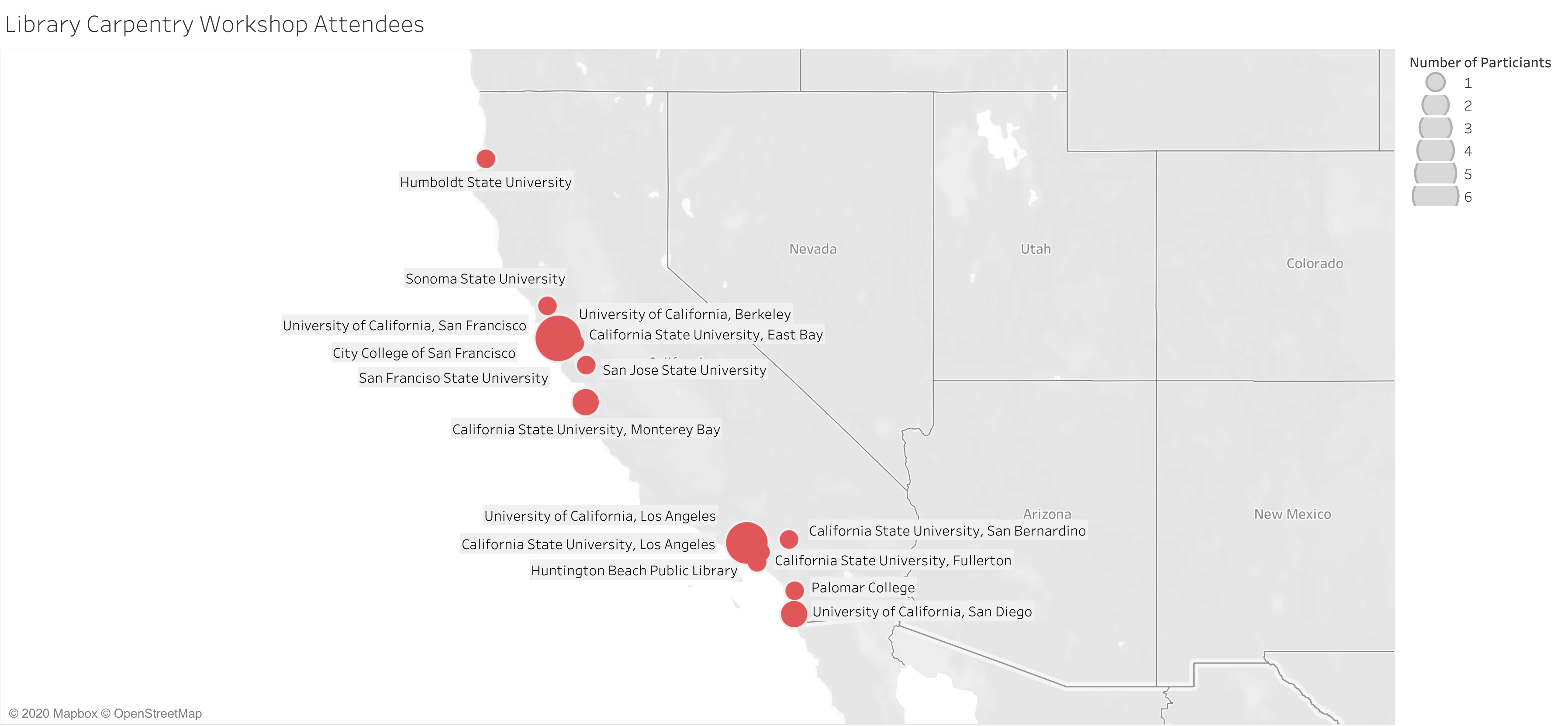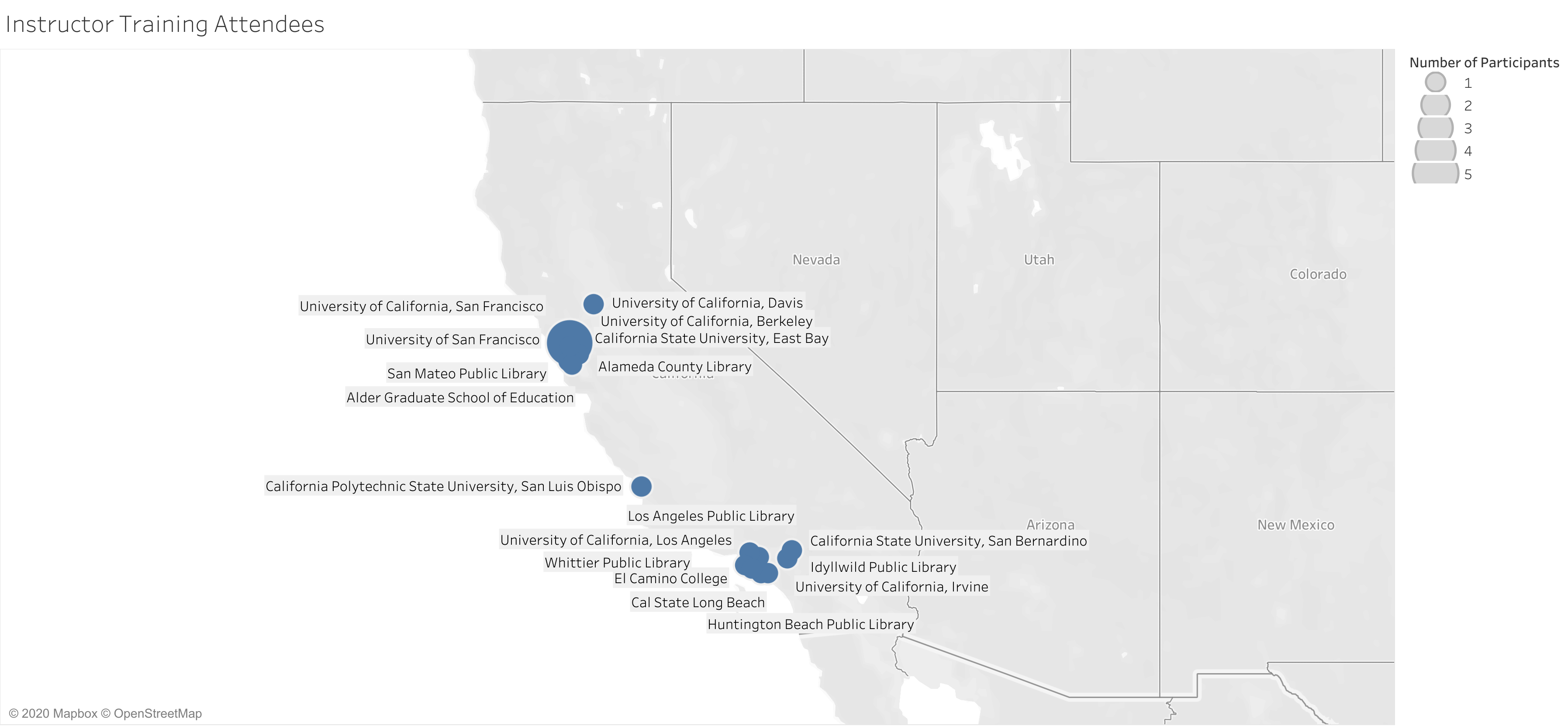Expanding The Carpentries Community in California
Between January and September 2020, I had the opportunity to work with an amazing group of librarians to develop the Carpentries community in California academic libraries. The goal for this project - which was funded by an IMLS grant through the California Digital Library - was to create sustainable communities of academic libraries across California that could work together to make computational training more accessible to librarians and the communities that they serve. I hoped to partner with existing Carpentries member libraries (largely in the University of California system) to teach workshops that would reach librarians in underserved state schools and community colleges. The plan was to offer Library Carpentry workshops, train librarians to teach with Instructor Training workshops, build local communities of practice, and promote Carpentries membership. With the COVID-19 pandemic we had to reimagine many aspects of the project to work in the virtual environment, but I was able to meet most of the original goals thanks to the work of many dedicated collaborators.
This project was truly a community endeavor and would not have been possible without:
- Catherine Nancarrow at the California Digital Library
- My workshop co-instructors and helpers (Leigh Phan, Reid Otsuji, Elizabeth McAulay, Tim Dennis, Stephanie Labou, Jamie Jamison, David Palmquist, Khue Duong, Charlie Macquarie, Scott Peterson, Lisa Ngo, Eric Lopatin)
- My January Trainer cohort, and fellow Trainers Tim Dennis and Zac Painter
- The Carpentries Core Team
- The Library Carpentry Advisory board
- Countless amazing librarians across California who shared their enthusiasm and expertise
So what did we accomplish?
Library Carpentry Workshops
The first phase of the project involved teaching Library Carpentry workshops. The idea was to reach librarians who had never heard of the Carpentries and teach them essential data skills while also introducing them to the Carpentries teaching philosophy. Working with Carpentries instructors in the Bay Area and Southern California, I scheduled two workshops for April and June. Then, like many Carpentries instructors this year, we had the experience of postponing our in-person workshops, and then rescheduling them in the virtual environment. It is due to the determination and enthusiasm of my co-instructors that we were successfully able to conduct online workshops in June and August (read more about our Aug workshop in our Carpentries blog post). While the virtual workshops took a lot of coordinating (and hours pouring over the Carpentries recommendation for online workshops) they actually allowed us to be more collaborative and reach more librarians from across the state. Together these workshops brought together 14 instructors and helpers (predominantly from Carpentries member institutions) to teach 29 librarians representing 16 California libraries.
 Library Carpentry Workshop Attendees in California
Library Carpentry Workshop Attendees in California
Instructor Training
Instructor Training was a chance to build on the momentum of Library Carpentry workshops and turn librarians into Carpentries champions at their institutions. After completing Carpentries Trainer Training in March, I worked with Tim Dennis at UCLA and Zac Painter at Stanford to organize two Instructor Training sessions in August and September. While the scope of this project originally targeted academic libraries, we decided to expand our pool to invite California public librarians to attend Instructor Training as well. This ended up being a great decision as they brought a different perspective to teaching technical skills and helped us think more broadly about the environments in which technology instruction occurs. While not all of the public librarians will pursue instructor certification, many of them appreciated the materials and approach of the Carpentries and shared that they would be bringing it back to their library. Through these training sessions we were able to train 22 librarians from 18 different California libraries.
 Instructor Training Attendees in California
Instructor Training Attendees in California
California Virtual Community
In order to make this work sustainable beyond the timeline of this project, there needed to be communities of practice where California librarians could connect and collaborate. This led to the creation of the California Librarians Carpentry Meetup, a quarterly virtual meetup, listserv, and slack channel (#California-libraries in the Carpentries slack) that was designed to bring together California librarians who are involved in the Carpentries, those who have attended a Carpentries workshop, and those who want to learn more/become involved in the Carpentries. To date we have held two meetups and have another one scheduled for February. The meetups have featured lightning talks on local Carpentries projects, discussions on how to keep learners engaged after a workshop, and demos of Carpentries-inspired curriculum.
Formalizing Regional Partnerships
In order to build sustainable partnerships around the Carpentries, we wanted to promote the idea of cementing regional collaborations with consortial Carpentries membership. As part of my work on this project, I partnered with members of the Carpentries core team to investigate new membership models. While the work developing new membership models is ongoing, the Carpentries recently selected 5 libraries to pilot a new member onboarding process that will allow them to better understand the member needs of libraries. I also worked with Julie Goldman and Chuck McAndrews to foster discussion of formal and informal library collaborations at the 2020 CarpentryCon session Library Collaborations and the Carpentries.
What To Do In Your Community
Just as Carpentries Instructors never teach alone, those looking to expand their Carpentries community should look for enthusiastic partners and collaborators. Is there a member library in your region? Are there badged instructors nearby? Can you find someone on the #libraries channel in the Carpentries slack to work with? Once you have your team, consider organizing a workshop for other librarians in your community. Remember that Self-Organised workshops are free, and that there are even more opportunities to collaborate and co-teach in the virtual environment. Ask workshop attendees to brainstorm how they will implement their new data skills into their library work, and encourage them to pursue Instructor Training. Spread the word to your colleagues and library leadership with our Carpentries overview handouts for library directors and librarians. Finally, consider formalizing a regional partnership by splitting the cost and benefit of a Carpentries membership.
Looking Forward
As the Carpentries community expands in California’s academic libraries we have a tremendous opportunity to partner with the public and special librarians in our area, and to promote Carpentries training in our larger regional networks and national organizations. Together we can make crucial computational training accessible to our colleagues and to everyone in the communities that we serve.